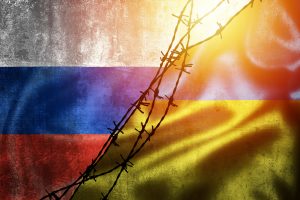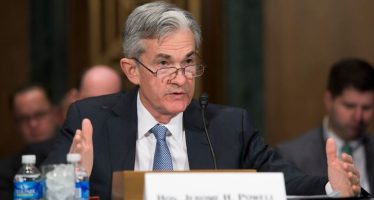Markets in Turmoil: President Putin’s ‘Technical Operations’ Upset the Apple Cart
 In the early morning of Thursday, Russian missiles rained down on Ukrainian military installations as markets in the far East opened for business and promptly took a beating in a rolling barrage that soon swept Europe and beyond.
In the early morning of Thursday, Russian missiles rained down on Ukrainian military installations as markets in the far East opened for business and promptly took a beating in a rolling barrage that soon swept Europe and beyond.
Stocks went down across the board whilst bond yields expanded on investor appetite for safe havens. Commodities from oil to grain also rose sharply, adding to the concern over inflation. Oil breached the $100-a-barrel mark with European benchmark Brent up 5.3% in early morning trading.
Winter wheat touched a 9-year high, surging 6% to $8.52 a bushel on the Chicago Mercantile Exchange. Corn rose in tandem. Nickel, aluminium, platinum, palladium, and of course gold also headed north double-quick time. Commodity analysts expect the rally to accelerate with some predicting an oil supercycle at levels approaching $125 a barrel.
Tumbling Shares
European shares opened sharply lower with the Euro Stoxx 50 dropping close to 5% and the FTSE 100 shedding 3%. In the US, aftermarket trading on Wednesday pointed to comparable losses for the S&P 500. The tech-heavy Nasdaq is expected to lose 2.5% at the resumption of trading, accumulating a 20% dive since its most recent peak thereby officially entering bear country.
Money piled into bonds, driving down the yield of the 10-year T-Bill to 1.882%. However, the worst onslaught was in Russia where trading on the Moscow Stock Exchange was briefly halted only to resume with a staggering crash, wiping out 44% of its market cap in a matter of minutes, prompting the central bank to intervene in support of the battered rouble and massively injecting liquidity into the banking system. Trading was again suspended later in the morning after short sellers had been ousted to no avail.
Notwithstanding the market crash following President Vladimir Putin’s dawn announcement of ‘special operations’ against Ukraine, Russian officials believe their country’s economy – diminutive by most standards – is essentially sanction-proof. The government runs an annual budget surplus (forecast at +0.9% in 2022) and has hoarded an estimated $630 billion in foreign exchange reserves.
Moreover, public debt stands at barely 20% of GDP. After the annexation of Crimea in 2014, and the Western sanctions that followed, Russia launched a vigorous import substitution drive, including a largely successful attempt to wean the nation off its penchant for foreign food products. However, according to several studies, imported goods still account for 75% of the products and ingredients that go into the making and manufacturing of everyday necessities, including food.
Fortress Russia
A fortress or not, in the apparently highly active mind of President Putin, Russia is free to go its own way, re-establish its sphere of influence, and able to dismiss or ignore outside threats or pressure.
However, the Kremlin’s failed attempts at de-dollarizing its trade are an Achilles heel. Half of the country’s international trade remains dollarized whilst fully a third is euro-denominated, leaving only a tiny sliver outside the reach of Western sanctions – and in the hands of Chinese president Xi Jinping, potentially enjoying a last laugh before long.
A significant part of the market volatility may be ascribed to the inability of Western powers to restrain Russia’s irredentism in any tangible way. The ‘mother of all sanctions’ being unveiled by the US and EU cannot hide the fact that talk will not likely stop rolling armour. Committed to remain outside the theatre of operations, NATO cannot do much more than shift a few thousand soldiers and their equipment around to bolster its eastern defences.
The United Nations is quite powerless as well, excitedly palavering in the Security Council and uttering words of great indignation and reprobation. Yet, the almost deafening cacophony of world leaders expressing their anger cannot disguise the tragic fact that fiery words mean nothing in the absence of a big stick.
Shock Without Awe
Ukraine then seems poised to suffer a fate not unlike the one meted out to Czechoslovakia in 1938 when the great powers stood by as Nazi Germany first occupied Sudetenland – not unlike Luhansk and Donetsk – as a prelude to overrunning the entire country. Appeasement didn’t work then and is unlikely to work now.
The only hope, a faint one, is that Ukraine somehow manages to stop the Russian advance – with or without outside help – and give the Russians time to pause and rethink their approach, possibly ditching their president in the process. Absent a quick victory, President Putin may have overplayed his hand. Apart from a few scenes depicting distant columns of billowing smoke, no televised Rumsfeld-style ‘shock-and-awe’ was seen though reports of Ukrainian resistance were likewise scarce – and invariably unconfirmed.
During an emergency meeting of EU ambassadors in Brussels to discuss sanctions, the representatives of Germany, Italy, and Cyprus urged moderation and proposed a more gradual approach. Whilst a diverse ensemble of oligarchs and all members of the Duma were placed on a European blacklist, President Putin – reportedly worth a jaw-dropping $200 billion – was exempted.
You may have an interest in also reading…
World Bank’s Vice President for Infrastructure: Now is the Time to Rethink Transport and Logistics
Covid-19 has had a huge impact on transport. The response to the pandemic, from social distancing to lockdown policies for
Fed Chair Powell: “Recovering to a Different Economy”
A river runs through it. President Christine Lagarde of the European Central Bank (ECB) argues that safely fording the ‘big
Peace-of-Mind for Financial Services Industry in 2024
In an industry where compliance is crucial, misplaced security ‘can be an operational death sentence’. Digital workspace solutions firm Espria

















































































